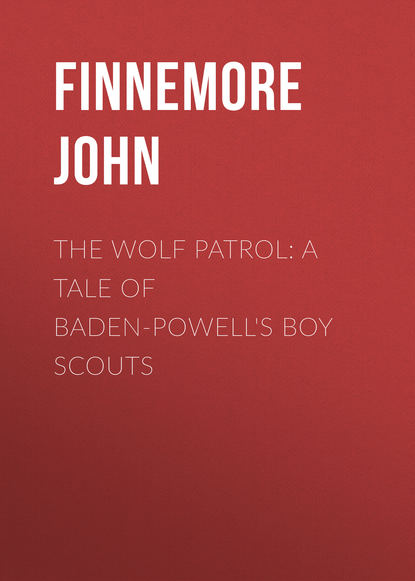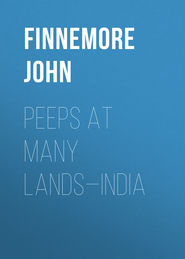По всем вопросам обращайтесь на: info@litportal.ru
(©) 2003-2024.
✖
The Wolf Patrol: A Tale of Baden-Powell's Boy Scouts
Настройки чтения
Размер шрифта
Высота строк
Поля
'That's too bad, uncle, about the poor old woman. I'll send the hat round and make our fellows fork out, and we'll square it up to her for her broken window.'
'Good idea, old chap!' said Mr. Elliott. 'Here's half a crown for a start.'
Dick thanked his uncle, and pocketed the coin.
'Well, we were talking about your scouting,' went on Mr. Elliott.
'Oh!' grinned Dick. 'Don't rot me about that. I give it up. I missed my kick that time.'
'That's all right,' said his uncle; 'I don't want to poke fun at you. I was only going to suggest this. Why don't you go in for real scouting? Learn to play the game properly. It's a wonderful game if you tackle it seriously – splendid sport, and a thousand times more useful, and better fun, than this foolish slugging business.'
'Some of the fellows at school have been talking about scouting,' said Dick. 'They've got hold of Baden-Powell's book, and they were awfully interested when I told them that you were in Mafeking with B. – P.'
'Yes, and a fine tenderfoot I was at the start!' laughed his uncle. 'When B. – P. told the townsmen they'd got to lend a hand, I was like a good few more. I thought I'd pick up what was wanted in no time. But I found that a useful man in the firing-line isn't made in a hurry. What a time he had with some of us fellows, who scarcely knew which end of a rifle to put to the shoulder!' And Mr. Elliott chuckled at the recollection.
'Have you read the first part of B. – P.'s book, Dick?' he asked in a moment.
'No,' replied Dick. 'I should like to uncommonly.'
'Here's a copy,' said Mr. Elliott, drawing the small paper-covered volume from his pocket. 'I bought it in London yesterday. Look it through, and if you and your chums like the idea of it, remember that I shall always be ready to lend you a hand if you wish to make a start.'
CHAPTER II
THE FOUNDING OF THE WOLF PATROL
On the next Monday evening Dick burst into his uncle's house like a whirlwind. Mr. Elliott was in his 'den,' reading the paper, and he looked up with a smile as the boy entered.
'Oh, uncle,' cried out Dick, 'can't we begin scouting at once? It's the jolliest thing I ever heard of, and all my chums think the same. We'd like to make up a patrol at once. And you said you'd lend us a hand, didn't you?'
'I did, Dick,' said his uncle, laying aside his paper. 'When is your next half-holiday?'
'We get Tuesdays, Thursdays, and Saturdays half-holidays in the week,' said Dick.
'All right,' said his uncle. 'I'll give you Thursday afternoons till you're on your own legs. Bring your men up here on Thursday afternoon at three.'
At the time named eight boys turned up, each with an eager look on his face, and a copy of the first part of 'Scouting for Boys,' which he had thumbed from end to end.
'Well, you're not scouts yet,' said Mr. Elliott to them, 'for you have to pass the tests, you know.'
'We've been at work on them already, uncle,' replied Dick. 'We can most of us do the first test – the knot-tying – and the last three are easy enough.'
'Very good,' said Mr. Elliott. 'Then I'll try you here on Tests 1, 4, and 6 – the knots, the laws and signs of scouts, and the Union Jack test.'
He took them in turn, and put everyone through his facings, and all came through in good shape.
'Now for Test 2,' said Mr. Elliott – 'to "track a deer's spoor, or describe a shop window." Which will you have?'
'The spoor! the spoor!' cried the boys.
'Then we'll go on to the heath,' said he.
Twenty minutes' walk brought them clear of the houses, and the road ran on through a great heath which stretched for several miles and was quite unenclosed. The party struck into a side-path, and soon gained a quiet spot. Here Mr. Elliott produced a pair of tracking-irons, which the boys examined with the most eager interest, and prepared to test the band one after another.
It was a capital place for the purpose, for clumps of gorse and holly were thickly scattered over the heath, affording excellent cover, and through these clumps the trainer would lay a track which each boy must follow for a quarter of a mile, and make the journey within fifteen minutes.
Five boys were successful, among these being Arthur Graydon and Dick Elliott. Three boys failed, not because their eyesight was poorer than that of the rest, but simply because they were unobservant, and did not pick up the trail quickly at one or two points where Mr. Elliott laid little traps for them, for he did not believe in making the test too easy.
'Well,' said Dick's uncle, 'five of you rank as second-class scouts now, and can make a beginning with a patrol; the other three will qualify next time, I expect.' And he took the failures in hand and showed them where they had slipped up in tracking his spoor. Mixed with instruction, he told them stories of the wonderful tracking he had seen performed in South Africa by both white men and natives, and the afternoon passed all too quickly for the deeply interested boys.
'What shall we call our patrol?' asked George Lee, one of the successful boys in passing the tests, as they walked home.
'I vote for Wolf!' cried Dick – 'the Wolf Patrol! That sounds jolly, I think.'
'Yes, we'll have that – the Wolf,' said Arthur Graydon.
'We must wait a little,' said Mr. Elliott, 'and see if any other patrols have been formed in Bardon. It won't do to clash, but I'll see about that.'
Mr. Elliott made inquiries, and found that though there was some talk of forming patrols here and there, yet not one was actually in existence in the neighbourhood. So Dick and his friends became 1st Bardon Troop, Wolf Patrol, and were very proud of that fact.
The Wolf Patrol now turned to with a will to convert themselves from second-class scouts into first-class. Arthur Graydon was chosen patrol leader, and Dick Elliott was the corporal. Whenever the Wolves met each other they gave the scouts' salute with great care, the rank and file receiving the secret sign in half-salute, while Arthur Graydon, as patrol-leader, was greeted with the full salute. Their pocket-money went like water for patrol flags, badges, crests, and tracking-irons, and every boy rigged himself up with khaki shorts and a khaki hat with broad brim, in proper scouts' style. Above all, they practised without ceasing the wolf's howl, which was the secret call of their patrol. Several of the Wolf Patrol lived quite near to each other, and at night they would go into their gardens, and scout would howl to scout in such mournful, long-drawn notes that peaceful, elderly gentlemen, reading the evening paper after dinner, rushed out to see if murder was being done somewhere.
CHAPTER III
CHIPPY HEARS OF NEW THINGS
One Saturday afternoon Chippy, the leader of the wharf-rats of Skinner's Hole, was crossing the heath on his way home. He had been with a message to a village some three miles from Bardon, and was taking a short cut over the heath, which he knew from side to side and corner to corner. Suddenly he stopped. He had heard a strange noise – a sound as of chanting or singing – and he wondered where it came from. In a moment he had fixed the place.
'That's in the old sand-'ole,' he muttered to himself, and he shuffled across the heath in his big, clumsy, hob-nailed boots towards the spot. In a couple of minutes he had wormed his way between two gorse-bushes growing at the edge of the deep hollow, and was looking with much interest at the sight beneath him.
It was the Wolf Patrol practising the scouts' war-dance. The old deserted sandpit made a splendid place for their patrol meetings for open-air work. They had come there that afternoon for practice in Test 12 – fire-laying and lighting, and cooking flour and potatoes without utensils. But, first of all, they were practising the war-dance. The strange words of the Scouts' Song floated up to Chippy's ears, but he could make nothing of them:
'Ingonyama – gonyama
Invooboo
Yah bobo! Yah bobo!
Invooboo.
But though Chippy did not understand the words, he understood that those fellows down there looked splendidly smart, and were having a fine time. He admired their uniform immensely; it looked so trim and neat compared with his own ragged garb. He admired their neat, quick movements as they stamped in unison with the words of the song, and moved round in a circle. The 'Ingonyama' chorus ended, and then the fire practice began. Chips and sticks were carefully piled, and a scout was allowed two matches to make a rousing fire of the gorse-stems and dried sticks to be found in the coppices on the heath. Then he went to work with his flour and potatoes.
Finally the patrol organized a hunt to finish the afternoon. George Lee was sent off on tracking-irons, and given ten minutes' start. When the time was up, the others went after him, and the sandpit was deserted. No one had observed Chippy, for the latter was a scout without knowing it, and had kept himself carefully hidden. He didn't know they were boy scouts, and on their honour to treat him and everyone else fairly; he only knew them as 'chaps we've slugged with,' as he put it to himself.
'Wot's the game, I wonder?' muttered Chippy to himself, as the last scout vanished behind a hazel thicket. 'Jolly good fun they're havin'. I should just like to know wot it all comes to.'
He slid down the side of the sandpit to examine the place where the scouts had built their fires, and soon was on the road to find out what it all meant. His sharp eyes, running over every mark the boys had left, saw something white in a long tuft of dried grass. He pounced upon it and picked it up. It was a book with a picture on the cover.
'Wot's this?' thought Chippy. 'A kid watchin' a ship round a rock. Wot for? "Scouting for Boys." Wot's inside?' He opened it at page 42, and at once recognized the scouts' uniform. 'Why, these chaps 'ad all got togs on like this,' said Chippy to himself. 'I'll bet this book's all about the game.'
He began to read, and was fascinated at once. Chippy talked badly because he had been brought up among people who talked badly, but he could read as well as any Grammar School boy, and had plenty of intelligence behind his freckled face to grasp what he read. He was deep in the little volume, when he heard the patter of running feet behind him. He turned, and saw Dick Elliott coming up to him. They knew each other at once.








